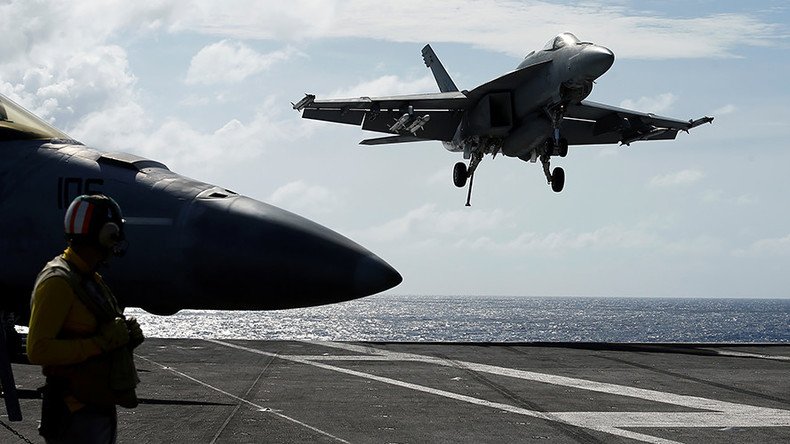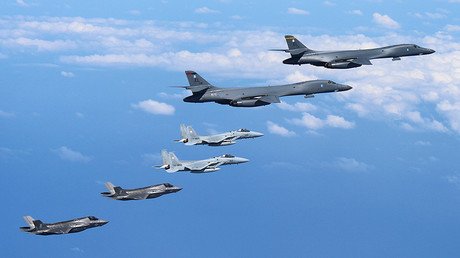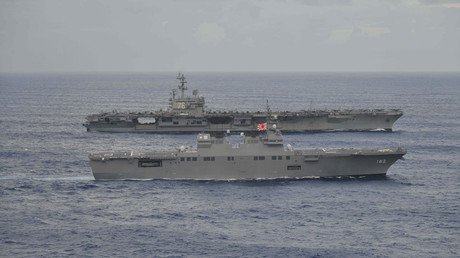USS ‘Ronald Reagan’, watched by China, conducts drills as North Korea tensions flare

With the crisis surrounding Pyongyang escalating, Washington’s only carrier based outside America, USS ‘Ronald Reagan’, conducted what have been described as “routine” military drills in the South China Sea under the vigilant eye of China.
F-18 Super Hornet jet fighters took off from the deck of the USS ‘Ronald Reagan’ aircraft carrier on Saturday as two Chinese frigates maintained a line-of-sight vigil, Reuters reported.
Officers on the Japanese-based ‘Reagan’ described frequent close-quarter surveillance from the ships of the People’s Liberation Army Navy in international waters, saying that at times Chinese vessels shadow the carrier en route to other destinations. Chinese frigates linger for days in the vicinity of US ships and planes that protect the ‘Reagan’.
The crew of the carrier ensure safe passage by alerting their unwanted Chinese escorts when the ‘Reagan’ sharply alters course, according to officers.
“We’ve had no issues. They’ve been very professional,” Rear Admiral Marc Dalton, commander of the strike group assigned to the ‘Reagan’, as well as the larger battle forces of the US Seventh Fleet, told Reuters.
“We see them on a regular basis,” he added.
The US regularly stages drills with its regional allies – South Korea and Japan – to demonstrate its strength to North Korea. The war games fuel fears in Pyongyang that they could be used as cover for an invasion.
The drills only provoke North Korea’s leadership into taking a confrontational stance, a senior Russian diplomat said earlier this week.
“The massive maneuvers staged near the coast of North Korea are apparently meant to taunt the North Korean leader [Kim Jong-un], to provoke him into some sloppy action,” Mikhail Ulyanov, head of the Russian Foreign Ministry’s non-proliferation and arms controls department, said on Tuesday as cited by Interfax.
Last week the 100,000-ton US Navy supercarrier ‘Ronald Reagan’ conducted drills with Japanese warships south of the Korean Peninsula, Japan's military said. Pyongyang, meanwhile, threatened a further “hydrogen bomb test” over the Pacific.
To help end the Korean crisis, Russia and China have meanwhile proposed a “double-freeze” plan, which would see Pyongyang suspend its nuclear and ballistic missile tests in exchange for a halt in joint US-South Korea military drills.
The US has rejected the proposal, saying that it has every right to conduct exercises with its ally, South Korea. The US has also demanded more sanctions, calling for Russia to stop supplying oil to North Korea. However, Moscow has rejected these calls, stressing that dialogue, not sanctions, is the only solution to the crisis.
On Saturday, US Secretary of State Rex Tillerson met with Chinese President Xi Jinping to discuss efforts to curb North Korea's nuclear ambitions and preparations for President Donald Trump’s upcoming visit to China, AP reported.
State Department Assistant Secretary Susan Thornton told a Senate hearing earlier this week that China, North Korea's main trade partner, appears to be on board with Washington’s plan to squeeze Pyongyang. “We are working closely with China to execute this strategy and are clear-eyed in viewing the progress – growing, if uneven – that China has made on this front," she said.
“We do see Chinese policy shifting,” she added, as members of the Senate Banking Committee urged for tougher action to clamp down on Pyongyang’s nuclear activities.














